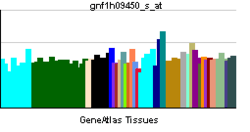VN1R3
| VN1R3 | |||||||||||||||||
|---|---|---|---|---|---|---|---|---|---|---|---|---|---|---|---|---|---|
| Identifiers | |||||||||||||||||
| Aliases | VN1R3, V1RL3, V1RL3p, FKSG46, vomeronasal 1 receptor 3 (gene/pseudogene) | ||||||||||||||||
| External IDs | GeneCards: VN1R3 | ||||||||||||||||
| |||||||||||||||||
| RNA expression pattern | |||||||||||||||||
 | |||||||||||||||||
| More reference expression data | |||||||||||||||||
| Orthologs | |||||||||||||||||
| Species | Human | Mouse | |||||||||||||||
| Entrez |
| ||||||||||||||||
| Ensembl |
|
| |||||||||||||||
| UniProt |
| ||||||||||||||||
| RefSeq (mRNA) |
|
| |||||||||||||||
| RefSeq (protein) |
|
| |||||||||||||||
| Location (UCSC) | n/a | n/a | |||||||||||||||
| PubMed search | [1] | n/a | |||||||||||||||
| Wikidata | |||||||||||||||||
| View/Edit Human | |||
Vomeronasal type-1 receptor 3 is a protein that in humans is encoded by the VN1R3 gene.[2]
References
Further reading
- Rodriguez I, Mombaerts P (2002). "Novel human vomeronasal receptor-like genes reveal species-specific families.". Curr. Biol. 12 (12): R409–11. doi:10.1016/S0960-9822(02)00909-0. PMID 12123587.
- Strausberg RL, Feingold EA, Grouse LH, et al. (2003). "Generation and initial analysis of more than 15,000 full-length human and mouse cDNA sequences.". Proc. Natl. Acad. Sci. U.S.A. 99 (26): 16899–903. doi:10.1073/pnas.242603899. PMC 139241
 . PMID 12477932.
. PMID 12477932. - Zhang J, Webb DM (2003). "Evolutionary deterioration of the vomeronasal pheromone transduction pathway in catarrhine primates.". Proc. Natl. Acad. Sci. U.S.A. 100 (14): 8337–41. doi:10.1073/pnas.1331721100. PMC 166230
 . PMID 12826614.
. PMID 12826614.
This article incorporates text from the United States National Library of Medicine, which is in the public domain.
This article is issued from Wikipedia - version of the 6/3/2016. The text is available under the Creative Commons Attribution/Share Alike but additional terms may apply for the media files.